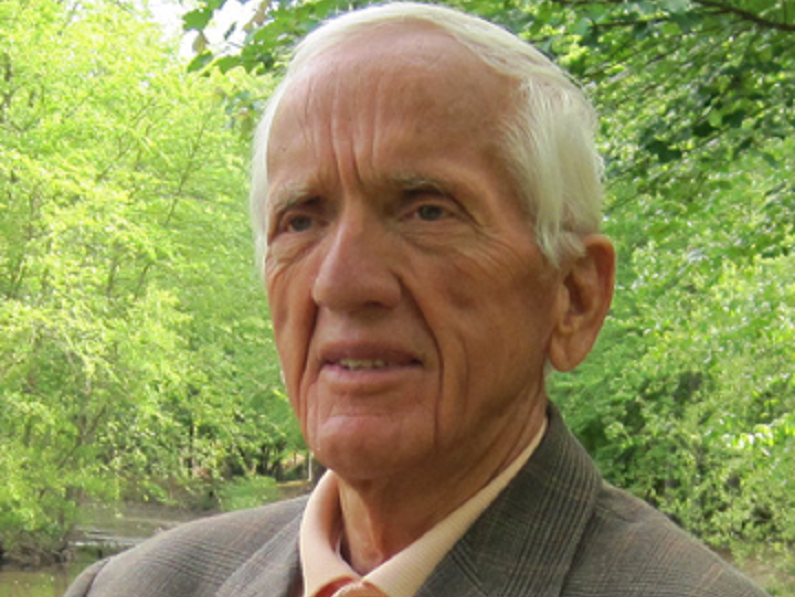T. Colin Campbell, PhD
Jacob Gould Schurman Professor Emeritus of Nutritional Biochemistry, Cornell University
Founder, T. Colin Campbell Center for Nutrition Studies
Founder, Plant-Based Nutrition Certificate program, eCornell Inc.
Co-author, “The China Study: Startling Implications for Diet, Weight Loss and Long-term Health”
Not very many individuals may be regarded as changing the course of history, but T. Colin Campbell, PhD is one such person. He has constructed a career path of distinguished research, scholarship and instruction spanning over half a century…. but most consequentially has devoted his accumulated knowledge and credibility to bringing to society some public health recommendations/conclusions that could make an enormous practical difference in the quality and length of people’s lives.
Coming from a rural dairy farming family background, Dr. Campbell completed Master’s and PhD degrees at Cornell University in animal nutrition, with doctoral minor study in biochemistry and microbiology. His earlier research efforts dealt with some of the headline-making toxicology and biochemistry issues of that time, such as identification and lethal effects of dioxin, the carcinogenicity of other components of herbicides, and the implications of aflatoxin contamination for liver disease. While an Associate Professor in the Virginia Tech University Department of Biochemistry and Nutrition, and while coordinating a U.S. State Department project evaluating adequacy of protein consumption for malnourished children in the Philippines, he made a startling observation that would trigger decades of tireless further investigation…. children who consumed large amounts of protein showed much higher incidence of liver cancer than did those who consumed small amounts.
After ten years’ service on the Virginia Tech faculty, Dr. Campbell accepted a full professorship at Cornell University, the base for his teaching and research for decades onward. In the aftermath of Senator George McGovern’s Select Committee on Nutrition and Human Needs controversially recommending that decreased meat consumption and increased vegetable, fruit and whole grain consumption could reduce heart disease incidence, the Director of the NIH National Cancer Institute was asked to testify at a Senate hearing…. and Dr. Campbell was invited as one of the reviewers for this testimony. He was shocked to learn that the Institute regarded at least 35% of all cancers as attributable to diet and nutrition, but only devoted 2% to 4% of its overall budget to dietary and nutritional effects upon cancer causation. A few years later, he was a member of the National Research Council’s committee which conducted the ground-breaking comprehensive federal study of the existing scientific information pertaining to the relationship of diet and nutrition to cancer. In 1982, the committee published the 478-page Diet, Nutrition and Cancer report, whose strongest public health guidance for cancer prevention was increasing the use of fruits, vegetables and whole grains, all as whole foods, and not in the form of derived supplements. The report also urged a reduction in the diet’s overall share of calories from fats.
Dr. Campbell welcomed to his Cornell laboratory Dr. Junshi Chen, the first senior scientist from the People’s Republic of China ever to visit the U.S. for a sabbatical leave. They studied intently the newly released Chinese Atlas of Cancer Mortality, covering 2,400 counties, that was undertaken in response to Premier Chou En Lai’s cancer affliction, and they recognized undeniable geographical localization of cancer incidence, and saw a crucial direction for future work. They pursued funding and began preparations for what would ultimately become the most comprehensive epidemiological study of relationships between diet and disease in human history…. a collaboration of the Chinese Academy of Preventive Medicine, the Chinese Academy of Medical Sciences, the University of Oxford and Cornell University. 6,500 carefully matched individuals in 65 Chinese counties were followed initially for 6 years, with measurement and recording of 367 separate lifestyle, nutritional-intake, health-status and mortality characteristics. Earliest data was released in 1989, in advance of publication of the 1990 monograph “Diet, Lifestyle and Mortality in China”.
International attention was drawn irreversibly toward Dr. Campbell’s work by the massive headline story of the New York Times Science section on May 8, 1990 about a “Grand Prix” of epidemiology: “Huge Study of Diet Indicts Fat and Meat”. However, the contents were in some ways more revealing and unprecedented than that label may suggest. Out of 367 data-items studied, the one most closely associated with greater risk of coronary heart disease, cancer, diabetes, hypertension and elevated blood cholesterol, was actually animal-derived protein…. even more so than were fat, animal fat or dietary cholesterol… and encompassing protein from all animal sources, such as dairy or fish, and not just meat. Dr. Campbell stated in the New York Times interview , “a diet that minimizes the intake of animal food might optimize reduction “ of the risk of both communicable and degenerative diseases, and “we’re basically a vegetarian species and should be eating a wide variety of plant foods and minimizing our intake of animal foods”. An invaluable new public health paradigm was born…. the hypothesis that the greatest single dietary determinant of health/disease outcomes was the overall proportion of plant-derived material vs. animal-derived material in our diets.
Dr. Campbell has retained to the present day his position as Jacob Gould Schurman Professor Emeritus of Nutritional Biochemistry in the Cornell University Division of Nutritional Sciences, and his directorship of the joint Chinese/British/American epidemiological research project, which continued further followups and extensive data analysis for the original 1983 Chinese study population. The latter work has also demonstrated the apparent alarming effects of recent decades’ “westernization” of dietary practices in various rural Chinese counties upon risks of chronic diseases.
Reflection upon a long career of investigations about nutrition and the causation/prevention of chronic disease led in 2005 to co-authorship, with Thomas M. Campbell II, of “The China Study: Startling Implications for Diet, Weight Loss and Long-term Health”…. indisputably one of the best-selling and most influential books about health or nutrition ever published. Dr. Campbell continued for many years to teach at Cornell an undergraduate nutrition course, which was one of the more popular offerings in the university curriculum, and then launched an eCornell online plant-based nutrition course that has set an authoritative educational standard regarding nutritional practices for disease prevention. He founded the 501(c)(3) nonprofit T. Colin Campbell Foundation, which was renamed T. Colin Campbell Center for Nutrition Studies, and which expanded the eCornell course into an online Plant-Based Nutrition Certificate that has earned widespread respect and renown.
Being featured in the award-winning documentary “Forks over Knives” has generated still wider public awareness of Dr. Campbell’s work, and he has authored the additional books “Whole” and “The Low-Carb Fraud”. In the aftermath of having received over 70 grant-years of peer-reviewed research funding, mostly from the National Institutes of Health, and having authored over 300 research papers, he has by now given many hundreds of lectures throughout the world. Honors received have ranged from a lifetime achievement award in 1998 from the American Institute for Cancer Research, to First Prize for Most Outstanding Publication in Preventive Medicine in China for 20 Years (1976-1996), to induction into the Vegetarian Hall of Fame in 2006. The term “plant-based” has truly come into the English language vocabulary solely due to his work.
In 1992, Physicians Committee for Responsible Medicine (PCRM) launched the concept of the “New 4 Food Groups” or vegan 4 food groups (vegetables, fruits, whole grains, legumes) as the foundation of diets which reduce our population’s risk of chronic diseases…. following closely upon publication of the China epidemiological study results by Dr. Campbell and associates. Neal Barnard, MD, PCRM President, was joined in the press conference announcing this by Dr. Campbell and by his close friend and colleague Denis Burkett, MD. Dr. Burkitt, then in the final year of his life, had long before made the ground-breaking research discovery that fiber, the most distinct marker for plant-derived whole foods, was associated with reduced risk of several chronic diseases such as colon cancer. Now, at the 25th anniversary of the launch of the New 4 Food Groups, the P-POD Conference has named the 2017 keynote address the First Annual Denis Burkitt Memorial Lecture…. and is profoundly grateful that it will be delivered by T. Colin Campbell, PhD, who possibly has contributed more to the cause of reducing chronic disease via nutrition than has any other human.


